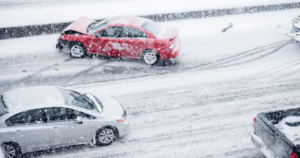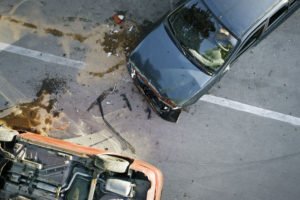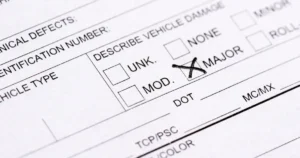Rear-end car accidents are among the most frequent types of crashes on Indiana roads. While liability often seems straightforward, Indiana law has nuances that can impact who is held responsible and how compensation is recovered. Understanding how fault is assigned – and what it means for your ability to recover compensation – can make all the difference in the outcome of your potential case.
How Common Are Rear-End Accidents?
Rear-end crashes are one of the most common collision types in the U.S., accounting for nearly one-third of all accidents. In Indiana, they frequently occur at intersections, stop-and-go traffic, and during poor weather. Even at lower speeds, these accidents can cause serious injuries like whiplash, concussions, or back injuries.
What Are The Most Common Causes of Rear-End Collisions?
Several factors may contribute to rear-end crashes, including:
- Distracted driving (texting, phone use, eating)
- Tailgating and following too closely
- Speeding or failing to reduce speed in heavy traffic
- Sudden stops at intersections or traffic lights
- Poor weather conditions like snow, ice, or rain
- Mechanical failures, such as brake problems
These causes are so frequent because they stem from everyday driving habits and conditions that leave little room for error. A few seconds of distraction, a driver following too closely, or reduced traction in bad weather can make it nearly impossible to stop in time. Even simple vehicle maintenance issues, like worn brakes or broken lights, can quickly turn routine driving into a serious collision.
How is Fault Determined in Indiana?
Indiana follows a modified comparative fault rule. This means each driver’s actions are analyzed, and liability may be shared. If you are found to be more than 50% at fault, you cannot recover damages. If you are less than 50% at fault, your recovery is reduced by your percentage of fault. Police reports, witness statements, and accident reconstruction often play a role in determining fault.
For example, if a driver is texting when the collision occurs, their share of fault may increase even if they were not the lead vehicle. Conversely, if the front driver’s brake lights were not working, liability may shift. Insurance adjusters may use this rule to reduce payouts, which is why it is important to have legal representation to ensure fault is fairly assigned and compensation is not unfairly minimized.
Can a Rear Driver Not Be Responsible For a Rear-End Crash?
Yes. Although rear drivers are often presumed liable, there are circumstances where the lead driver or another party may be responsible. Examples include:
- A driver who cuts suddenly into another lane without warning
- Brake lights or hazard lights not functioning properly
- A vehicle stopping abruptly without a valid reason
- Road hazards or negligent maintenance by a third party (e.g., construction crews, municipalities)
A rear driver is not always automatically at fault. Indiana law looks at the total circumstances, and if another driver’s negligence, faulty equipment, or hazardous road conditions contributed to the crash, liability may shift away from the rear driver. This is why careful investigation is very important before fault is assigned.
Do I Need a Lawyer After an Indiana Rear-End Crash?
Insurance companies may argue over liability or minimize your injuries. An experienced personal injury lawyer from our firm can help to:
- Investigate the accident and gather evidence
- Challenge unfair fault determinations
- Handle negotiations with insurers
- Ensure medical bills, lost wages, and pain and suffering are fully accounted for
Without legal guidance, you may risk settling for less than your case is truly worth. At Pfeifer, Morgan & Stesiak, our team of award-winning auto accident lawyers have a comprehensive understanding of Indiana’s auto accident laws. We can help to review the specific details of your incident, determine if you have grounds to file a lawsuit and help to recover the maximum amount of financial compensation available for your potential case.
What Compensation is Available After a Rear-End Crash?
Victims may be eligible to recover compensation for:
- Medical expenses (current and future)
- Lost wages and diminished earning capacity
- Pain and suffering
- Property damage
- Rehabilitation and ongoing care needs
Compensation after a rear-end crash is meant to make victims financially whole and support their recovery. The exact amount depends on the severity of injuries, how the crash impacts daily life and work, and the long-term care required. If you have questions about a potential damages claim, a lawyer from our firm can help to answer those questions in a free consultation.
Injured in a South Bend Rear End Crash? We Can Help!
Liability in a rear-end accident in Indiana is not always as simple as it may seem. If you or a loved one has been injured in a crash, the attorneys at Pfeifer, Morgan & Stesiak can review your case, protect your rights, and pursue the full compensation you deserve. It’s free to talk to a lawyer to find out if you have a case and there are no upfront fees if we agree to handle your case. Contact us today to learn more the options that may be available for your rear end collision.




